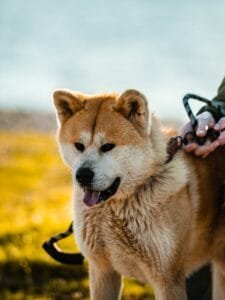
Pointer Dog Training Guide.
Bringing home a new Pointer dog is an exciting time, filled with endless possibilities for companionship, adventure, and fun. However, as any experienced dog owner knows, a well-trained Pointer is essential for a harmonious and rewarding relationship. These energetic, intelligent pups require specialized training to channel their natural hunting instincts and develop into obedient, well-behaved canine companions. Pointer dog training is challenging but rewarding also. Pointer training and hunting dog training in general calls for specific approach in order to succeed.
In this comprehensive guide to pointer dog training we’ll dive into the unique training needs of Pointer dogs and equip you with the knowledge and techniques to transform your new furry friend into a responsive, well-mannered addition to your family. Whether you’re a first-time Pointer owner or looking to refine your existing training approach, this post will provide you with the essential tools and strategies to set your Pointer up for success.
Understanding the Pointer Breed
Pointers, also known as English Pointers, are a versatile breed of hunting dogs originally developed in Europe. These athletic canines were bred to assist hunters by “pointing” at game, indicating the location of prey for the hunter to approach and flush out. This innate hunting drive is a defining characteristic of the Pointer breed, and it’s crucial to understand and harness this instinct during the pointer dog training process.
Pointers are known for their distinctive physical features, including a sleek, muscular build, a long, tapered muzzle, and a short, smooth coat. They typically range in height from 23 to 28 inches at the shoulder and can weigh between 45 to 75 pounds, depending on the individual dog’s size and gender.
Beyond their physical attributes, Pointers are also renowned for their intelligence, trainability, and boundless energy. These dogs thrive on mental stimulation and physical activity, making them an excellent choice for active owners who can provide the necessary outlets for their energetic nature.
Establishing a Strong Foundation
Successful Pointer training begins with establishing a solid foundation of obedience and socialization. Starting from a young age, it’s essential to introduce your Pointer puppy to a variety of people, animals, and environments to help them develop into well-adjusted, confident canines.
Socialization
Socialization is a critical component of Pointer training, as it helps your pup become comfortable and confident in various situations. Expose your Pointer to a wide range of experiences, such as:
- Introducing them to different people, both adults and children
- Allowing them to interact with other well-behaved dogs in a controlled setting
- Familiarizing them with various sounds, sights, and textures found in their environment
By providing these positive socialization experiences, you’ll help your Pointer develop the necessary skills to navigate the world with ease and confidence, reducing the likelihood of behavioural issues down the line.
Basic Obedience Training
Alongside socialization, it’s crucial to begin basic obedience training with your Pointer puppy as early as possible. This foundation will lay the groundwork for more advanced training and help your pup learn essential commands, such as:
Consistent, positive-reinforcement-based training sessions will help your Pointer develop the discipline and responsiveness needed to excel in both everyday situations and more specialized hunting or competition settings.
Harnessing the Pointer’s Hunting Instincts
One of the most defining characteristics of the Pointer breed is their strong hunting instinct. Channelling this natural drive is a crucial aspect of Pointer training, as it can help you harness your dog’s innate abilities while also ensuring they remain obedient and well-behaved.
Introducing Hunting-Specific Training
As your Pointer matures, you can begin to incorporate hunting-specific training into their regimen. This may include:
- Teaching them to “point” at game, indicating the location of prey
- Introducing them to the scent of various game animals
- Practicing “retrieving” exercises, where your Pointer learns to bring back downed birds or other small prey
By gradually exposing your Pointer to these hunting-related tasks, you’ll help them develop the skills and confidence needed to excel in the field, while also reinforcing their obedience and responsiveness to your commands.
Maintaining Hunting Drive and Focus
To keep your Pointer’s hunting instincts sharp, it’s essential to provide regular opportunities for them to engage in hunting-related activities. This may include:
- Participating in hunting-focused training sessions or competitions
- Exposing your Pointer to the scents and sounds of the hunting environment, such as taking them on walks in areas where game is present
- Incorporating interactive toys and puzzles that mimic the hunt, such as hide-and-seek games or food-dispensing toys
By consistently engaging your Pointer’s hunting drive, you’ll help maintain their focus, enthusiasm, and overall obedience, ensuring they remain a well-rounded and responsive canine companion.
Addressing Common Pointer Behavioural Challenges
While Pointers are generally eager to please and responsive to training, they can also present unique behavioural challenges that require a tailored approach. Understanding and addressing these issues can help you build a strong, trusting relationship with your Pointer.
Prey Drive and Chasing Instincts
Pointers’ strong prey drive and natural instinct to chase can lead to behavioural problems, such as:
- Bolting after small animals or birds
- Ignoring recall commands when in pursuit of prey
- Exhibiting destructive behaviours, such as digging or chewing, as a result of pent-up energy
To address these issues, it’s essential to provide ample opportunities for your Pointer to safely engage in hunting-related activities, both physical and mental. Incorporate regular exercise, such as long walks, jogs, or playtime in a secure, enclosed area, to help channel their energy in a positive direction.
Additionally, reinforce your Pointer’s recall training and practice it regularly in various environments to ensure they respond reliably, even when faced with tempting prey.
Separation Anxiety and Boredom
Pointers are highly social and intelligent dogs that can struggle with being left alone for extended periods. This can lead to behaviours such as:
- Excessive barking or whining
- Destructive chewing or scratching
- House-training accidents
To prevent and manage separation anxiety, it’s crucial to provide your Pointer with ample mental and physical stimulation throughout the day. This may include:
- Leaving interactive toys or puzzle feeders to occupy their mind when you’re away
- Gradually acclimating your Pointer to being alone, starting with short periods and gradually increasing the duration
- Providing regular exercise and playtime to tire them out before your departure
By addressing your Pointer’s need for companionship and activity, you can help mitigate the risk of separation-related behavioural issues.
Continuous Training and Enrichment
Pointer training is an ongoing process that requires patience, consistency, and a commitment to providing your canine companion with continuous learning and enrichment opportunities. As your Pointer matures, their training needs may evolve, and it’s essential to adapt your approach accordingly.
Advanced Training and Competitions
As your Pointer becomes proficient in basic obedience, you can explore more advanced training opportunities, such as:
- Participating in hunting-focused competitions or field trials
- Engaging in agility or other canine sports to challenge their physical and mental abilities
- Pursuing specialized training, such as scent work or tracking, to further develop their natural hunting skills
These advanced training activities not only provide physical and mental stimulation but also deepen the bond between you and your Pointer, as you work together to achieve new goals and milestones.
Ongoing Socialization and Enrichment
Maintaining your Pointer’s socialization and providing ongoing enrichment is crucial throughout their lifetime. This can include:
- Regularly exposing your Pointer to new people, animals, and environments to reinforce their confidence and adaptability
- Incorporating interactive toys, puzzle feeders, and scent-based activities to challenge their minds and prevent boredom
- Providing ample opportunities for physical exercise, such as hiking, swimming, or retrieving games, to meet their high-energy needs
By prioritizing continuous training and enrichment, you’ll help ensure your Pointer remains a well-adjusted, obedient, and fulfilled canine companion for years to come.
Conclusion
Owning and training a Pointer dog is a rewarding and fulfilling experience, but it also requires a deep understanding of the breed’s unique characteristics and needs. By mastering the art of Pointer training, you’ll not only develop a stronger bond with your furry friend but also help them reach their full potential as a well-behaved, versatile, and capable canine companion.
Remember, the key to successful Pointer training lies in establishing a solid foundation of obedience and socialization, harnessing their innate hunting instincts, addressing common behavioural challenges, and providing continuous learning and enrichment opportunities. With patience, consistency, and a positive, reward-based approach, you can transform your Pointer into a true partner in adventure and a beloved member of your family.
If you’re ready to embark on this rewarding journey with your Pointer, I encourage you to explore the comprehensive training resources and personalized support available at Active K9s. Our team of experienced Pointer trainers is dedicated to helping you and your furry friend reach new heights of success and enjoyment. Visit our website at activek9s.com/book-training to learn more and schedule your first training session today.



